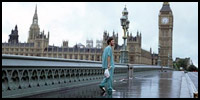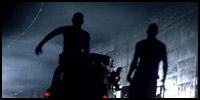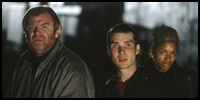
 |
|
28 Days Later (2003) Cast: Cillian Murphy, Naomie Harris, Megan Burns, Brendan Gleeson, Christopher Eccleston, Noah Huntley. 2003 – 112 minutes Rated: Reviewed by Dustin Putman, June 27, 2003.  When a group of well-meaning animal activists break into a laboratory and release a group of monkeys, they realize too late that they have been enslaved for a reason: the monkeys are infected with a "rage" virus that has turned them into contagious, bloodthirsty monsters. Fast forward twenty-eight days, as Jim (Cillian Murphy) wakes up from a coma in a deserted, torn-apart hospital. As Jim wanders around the city, he discovers that all of London has seemingly been wiped out from what he can only predict to be some sort of plague. Then he meets two survivors, Selena (Naomie Harris) and Mark (Noah Huntley), followed by a scared father (Brendan Gleeson) and teenage daughter (Megan Burns) holed up in their apartment, all of whom clue him into what is going on. It seems the virus has infected most of the population of not only England, but Paris and New York, turning the inhabitants into mindless zombies with a thirst for blood within twenty seconds of contact. With no other hope, Jim and his comrades decide to travel to a military barricade they hear about from a radio recording, unsure even if it still exists.
When a group of well-meaning animal activists break into a laboratory and release a group of monkeys, they realize too late that they have been enslaved for a reason: the monkeys are infected with a "rage" virus that has turned them into contagious, bloodthirsty monsters. Fast forward twenty-eight days, as Jim (Cillian Murphy) wakes up from a coma in a deserted, torn-apart hospital. As Jim wanders around the city, he discovers that all of London has seemingly been wiped out from what he can only predict to be some sort of plague. Then he meets two survivors, Selena (Naomie Harris) and Mark (Noah Huntley), followed by a scared father (Brendan Gleeson) and teenage daughter (Megan Burns) holed up in their apartment, all of whom clue him into what is going on. It seems the virus has infected most of the population of not only England, but Paris and New York, turning the inhabitants into mindless zombies with a thirst for blood within twenty seconds of contact. With no other hope, Jim and his comrades decide to travel to a military barricade they hear about from a radio recording, unsure even if it still exists.
 "28 Days Later" is more commendable for what it aspires to rather than for what it ends up achieving. Director Danny Boyle (2000's "The Beach") has crafted what is, in essence, a bleak zombie movie along the lines of George Romero's "Night of the Living Dead," but he has more weighty topics to cover along the way. The screenplay, written by Boyle's "The Beach" collaborator, Alex Garland, focuses on the psyche of its characters and the value of one's humanity (or lack thereof). The film also delves into the reality of the situation, asking the viewer along the way what they would do if placed in the same circumstances. Would they refuse to leave their friends behind, as Jim vows, or would they do whatever possible to save themselves, as Selena practices? The movie's tone is one of sheer melancholy, and appropriately so, brightened only by sporadic natural humor as the ensemble struggle to remain sane and keep whatever positive outlook they have left on the world's future.
"28 Days Later" is more commendable for what it aspires to rather than for what it ends up achieving. Director Danny Boyle (2000's "The Beach") has crafted what is, in essence, a bleak zombie movie along the lines of George Romero's "Night of the Living Dead," but he has more weighty topics to cover along the way. The screenplay, written by Boyle's "The Beach" collaborator, Alex Garland, focuses on the psyche of its characters and the value of one's humanity (or lack thereof). The film also delves into the reality of the situation, asking the viewer along the way what they would do if placed in the same circumstances. Would they refuse to leave their friends behind, as Jim vows, or would they do whatever possible to save themselves, as Selena practices? The movie's tone is one of sheer melancholy, and appropriately so, brightened only by sporadic natural humor as the ensemble struggle to remain sane and keep whatever positive outlook they have left on the world's future.
 At its heart, however, "28 Days Later" does fall well within the boundaries of the horror genre. As such, audiences walking in only ask that they are offered a taut ride that succeeds in some form in giving them goosebumps. "28 Days Later" offers more than this, as its introspective tone and thought-provoking notions play out, but it fails as a horror movie. There are a few tense moments and some notable scares, to be sure, but they come in fits and starts between overlong, slow sections where not much happens. The pacing is especially poor, because while the opening half hour is effective in its deliberate build-up, the rest becomes monotonous by keeping this lugubrious pace. Most of all, the film lacks momentum, and during the rainswept finale, the plot developments take a turn for the confused and jumbled. Without giving anything away, things occur in the climax that go unexplained, and certain characters do things without any reason behind them.
At its heart, however, "28 Days Later" does fall well within the boundaries of the horror genre. As such, audiences walking in only ask that they are offered a taut ride that succeeds in some form in giving them goosebumps. "28 Days Later" offers more than this, as its introspective tone and thought-provoking notions play out, but it fails as a horror movie. There are a few tense moments and some notable scares, to be sure, but they come in fits and starts between overlong, slow sections where not much happens. The pacing is especially poor, because while the opening half hour is effective in its deliberate build-up, the rest becomes monotonous by keeping this lugubrious pace. Most of all, the film lacks momentum, and during the rainswept finale, the plot developments take a turn for the confused and jumbled. Without giving anything away, things occur in the climax that go unexplained, and certain characters do things without any reason behind them.
 The performances, given mostly by little-known British actors, are quite good, with Cillian Murphy leading the way as Jim, whose bewilderment to what has occurred during his coma is palpably portrayed. As the no-nonsense Selena, Naomie Harris is a fresh face who commands the screen with equal measures of sturdy tough-mindedness and an underlying vulnerability. Filling out the major players, Brendan Gleeson (2002's "Gangs of New York") and Megan Burns poignantly inhabit the roles of father and daughter, whose only true hope is to hang on to each other.
The performances, given mostly by little-known British actors, are quite good, with Cillian Murphy leading the way as Jim, whose bewilderment to what has occurred during his coma is palpably portrayed. As the no-nonsense Selena, Naomie Harris is a fresh face who commands the screen with equal measures of sturdy tough-mindedness and an underlying vulnerability. Filling out the major players, Brendan Gleeson (2002's "Gangs of New York") and Megan Burns poignantly inhabit the roles of father and daughter, whose only true hope is to hang on to each other.
 Director Danny Boyle emphatically knows exactly what it takes to create a distinct atmosphere within his film (the sequences of a lonely, barren London landscape are downright ominous). He shoots with DV-video, giving his images a grainy, washed-out quality that indelibly accompanies the subject matter. Where "28 Days Later" makes its fatal misstep is in its yearning to be about more than it should be. The result is something schizophrenic in nature, as its existential side fights against its gory side where rotting beings and gruesome dismemberment are the main course. It doesn't help that the final scene is needlessly upbeat, a picture-perfect cheat that fails to trust its audience with a more fitting dark approach. "28 Days Later" holds a handful of chilling scenes and unforgettable images, but its cumulative effect is one of disappointment and missed opportunities.
Director Danny Boyle emphatically knows exactly what it takes to create a distinct atmosphere within his film (the sequences of a lonely, barren London landscape are downright ominous). He shoots with DV-video, giving his images a grainy, washed-out quality that indelibly accompanies the subject matter. Where "28 Days Later" makes its fatal misstep is in its yearning to be about more than it should be. The result is something schizophrenic in nature, as its existential side fights against its gory side where rotting beings and gruesome dismemberment are the main course. It doesn't help that the final scene is needlessly upbeat, a picture-perfect cheat that fails to trust its audience with a more fitting dark approach. "28 Days Later" holds a handful of chilling scenes and unforgettable images, but its cumulative effect is one of disappointment and missed opportunities.
|
© 2003 by Dustin Putman |














